|
John D. Quinn, Sr.  J.D.
Quinn was born about 1819 in Ireland of unknown parentage. He
married Mary Ann O'Maley, also born in Ireland, in January 1827, oldest
child and daughter of James O'Maley and Alice "Allie" Graham.
The 1855 New York Census for the 6th Ward of Rochester, Monroe County listed Mary as living with her parents; the record indicates that her father arrived in New York before his family, in about 1829, while his family arrived about 4 years later in 1833. James O'Maley was a contractor. Both of the O'Maley daughters were born in Ireland whereas the 3 brothers were born in Rochester, New York. J.D. Quinn and Mary Ann O'Maley were married sometime between 1855 and the 1860 New York Federal census. In 1860 J.D. and Mary are living in her parents' household; both James O'Maley & J.D. Quinn are employed as contractors. They have a daughter, Mary Alice, who was 8 months old. A second daughter, Mary C. Quinn, was born in 1862 and their only son, John D. Quinn, Jr., was born in April 1864. J.D. Quinn and his in-laws were operating a liquor store in Rochester, New York, under the name of O'Maley & Quinn, in the Washington Building, which burned as a result of a stove and suffered only minor damages. (Union & Advertiser, January 2, 1864). Soon afterwards according to the Union & Advertiser of April 21, 1864, J. D. Quinn left his wife in New York in 1864 and traveled to California with her brother, Owen O'Maley, to take contracts for the Pacific Railroad. Their daughter was just over a year old at the time, and their son had just been born. Subsequent entries on the same timeline show that J. D. did not live with his family much, if at all, during the next and final 35 years of his life. According to the 1875 York, Livingston Co., New York census Mary Ann O'Maley Quinn is a 47 years old boarder in the household of Ephraim and Martha Bates along with her two youngest children, ages 13 and 11; apparently the eldest daughter had died. However, J.D. had returned east from California by 1870 and was living in Chicago, Cook Co., Illinois with his brother-in-law, Owen O'Maley and family; Owen's occupation was that of a clerk in the U.S. Court, while J.D.'s occupation was listed as Assistant Marshal. Later in that decade both men moved to Denison, where Owen O'Maley died in 1894. By winter 1894 J.D. Quinn was one of the Directors of The National Bank of Denison (The Sunday Gazetteer, Sunday, November 4, 1894, pg. 3) He settled in Denison in the early 1870s, while his wife and children remained in New York. The children may have grown up without seeing their father much, if at all. In December 1875, local newspapers mention that J.D. Quinn & J.F. Cuff had purchased 80 acres just north of Denison and were surveying the land into lots on which to build tenement houses. The 1887 Denison, Grayson Co., Texas City Directory lists J.D. Quinn as a railroad contractor, living over 417 West Main St. There are references to "the J. D. Quinn building" in the Gazetteer. That may have been 417, or it could have been some other address on Main Street. The Sunday Gazetteer Sunday, March 16, 1890 Col. J.D. Quinn, the railway contractor, has opened up a new stone quarry south of the Carpenter's Bluff road and east of the city, from which he is taking some of the finest stone yet seen in these parts. As many men did in Denison, J.D. Quinn became associated with the railroad business. His area of business was to produce from a local quarry, rock needed by the work gangs The Sunday Gazetteer Sunday, July 19, 1891 PERSONALS Wednesday evening Mr. J.D. Quinn left over the Central for White Sulphur Springs, West Virginia, where he expects to remain a month or 6 weeks. During his absence the quarries east of the city will continue to be operated and the stone shippped down the line to the foremen of the bridge gangs as usual. His business, although of vast magnitude, requiring the outlay of thousands of dollars monthly, is in such excellent order and good condition that a 2 months' absence does not materially interfere with its progress. At present he has between 20 and 30 hands employed here, and equally as many more on the works down the road. Two years ago Mr. Quinn spent the summer at White Sulphur and so great were the benefits derived from the famous West Virginia health resort that, apparently, the cycle of time had gone backward at least 10 years. One wonders what moved Mary Ann to file for the divorce almost 28 years after J. D. took off for California. 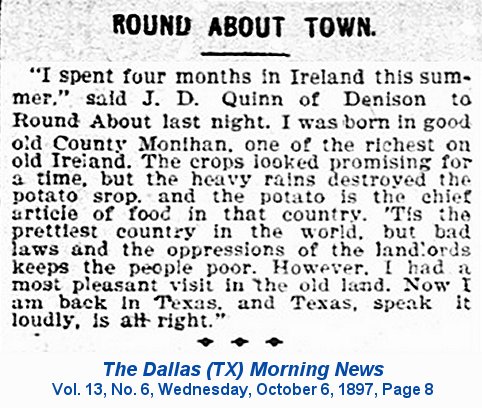 Quinn returned to Texas from his Ireland visit about a year-and-a-half before his death. The report in The Sunday Gazetteer on the day after he died said he had been battling cancer for more than two years. Mr. Quinn died in Denison, Grayson Co., Texas where he had lived a life praised by all who knew him. He is buried in Calvary Cemetery, the cemetery associated with St. Patrick's Catholic Church in Denison. The Sunday Gazetteer DEATH OF COL. J.D. QUINN
OBSEQUIES OF COL. J.D.
QUINN 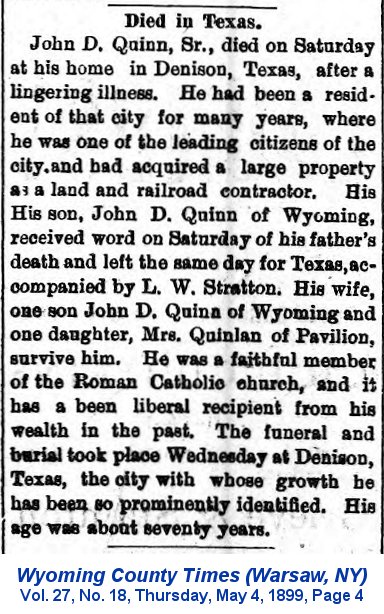 When J. D. Quinn died five years later, he willed a horse and buggy to his nephew (Owen's son), C. J. "Charley" O'Maley. Then J. D.'s son and daughter showed up in Denison for his funeral and promptly announced their intentions to contest his will. 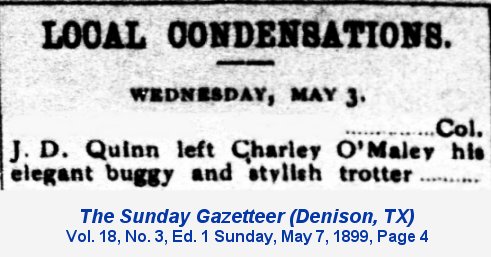 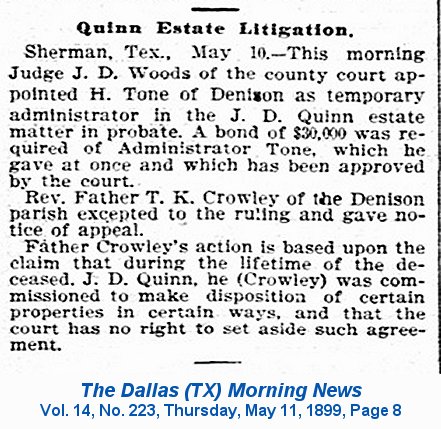 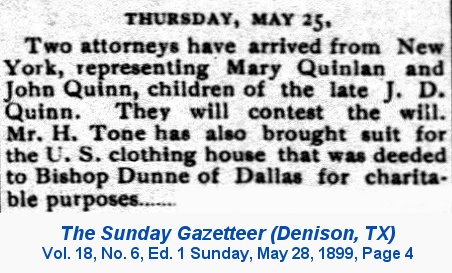 The Gazetteer reported in September of 1902 that the U.S. Clothing Company was moving from 209 to 213 W. Main. The Sunday Gazetteer Sunday, October 8, 1899 The Dallas News in a Sherman dispatch says: The interesting contest over the disposition of the property of J.D. Quinn, deceased, ended in an appeal from the appointment of Rev. Father Crowley as executor of the property devised in the will, and an appeal from the appointment of H. Tone, Sr., as temporary administrator of the property not so devised. The Gazetteer learns that the matter will be carried to the district court. The report in The Dallas Morning News of J. D. Quinn's death estimated the value of his estate at $100,000; In today's dollars that's the equivalent of about $2.8 million. The settlement of the estate litigation may explain the 1902 snippet about Mary Quinn Quinlan's suit against Father Crowley to collect a debt. She must have felt he was dragging his feet in keeping his part of the bargain as set forth in the settlement. 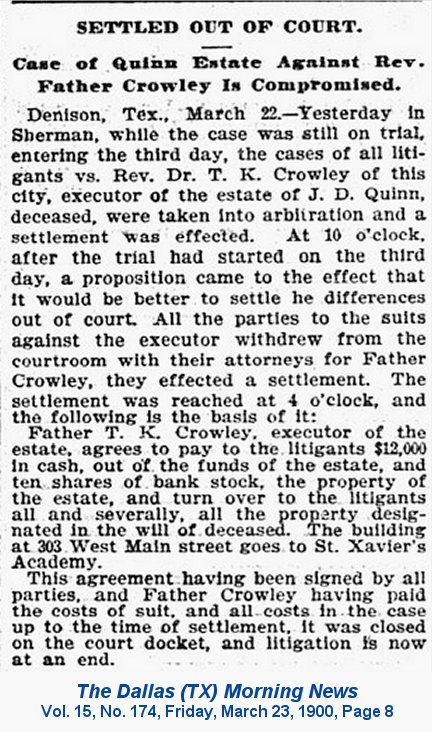 The settlement provided for the building at 303 W. Main to go to St. Xavier's Academy. Madden's Department Store spanned three buildings from 301 to 305 W. Main. Owen McCarthy
owned 301, Quinn owned 303, and Mary B. Murphy owned 305 (that's how I
read it, anyway). That block burned in early January of 1898 but was
rebuilt almost immediately. The building at 303, then, was relatively
new when St. Xavier's took ownership after Quinn's death. Mary Ann Quinn, John D. Quinn, Jr. and daughter, Mary C. Quinn Quinlan, lived out their lives in New York and are buried there.  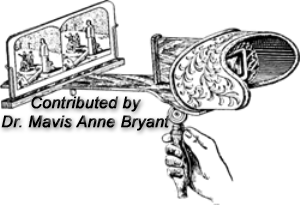 Irish Americans Biography Index Susan Hawkins © 2024 If you find any of Grayson County TXGenWeb links inoperable, please send me a message. |